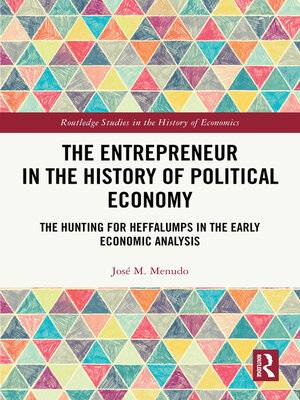The Entrepreneur in the History of Political Economy
ebook ∣ The Hunting for Heffalumps in the Early Economic Analysis · Routledge Studies in the History of Economics
By José M. Menudo

Sign up to save your library
With an OverDrive account, you can save your favorite libraries for at-a-glance information about availability. Find out more about OverDrive accounts.
Find this title in Libby, the library reading app by OverDrive.



Search for a digital library with this title
Title found at these libraries:
| Library Name | Distance |
|---|---|
| Loading... |
Modern economic theory has marginalised the figure of the entrepreneur, despite their significance in economic activity. Entrepreneurs rose in prominence as economic agents during the Enlightenment, but no consensus on this issue was formed in the period. This book addresses the role of the entrepreneur in the economic thought of the 18th and early 19th centuries, filling a gap in the historiography of economics.
The book reassesses the conflicting views on the entrepreneur held by leading economic thinkers such as Richard Cantillon, David Hume, François Quesnay, A.R.J. Turgot, Adam Smith, Jeremy Bentham and Jean-Baptiste Say. They had differing opinions on the role of the entrepreneur in various economic debates, including economic growth, price formation, conception of production, construction of economic agents, innovation, and the market of capital. These debates and treatises highlight the importance of the entrepreneur and yet the figure was later excluded from the classical canon in economics. This book explores the emergence of entrepreneurial activity as a recognised factor of production in economic theory, the contributions and connections of Enlightenment economist, and the reasons for the concept's disappearance.
The book will be of great interest to readers in the history of economic thought, history of entrepreneurship and management, economic history and economic theory more broadly.







